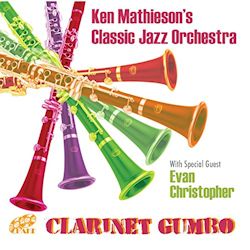Stop & Go
Moulin á Café
Lament for Javanette
Black Bottom Stomp
Dardanella
Jelly Roll
Ganjam
Rado Scuffle
Fazola
Charlie the Chulo
Superior Rag
Pelican Drag
Jazz Jubilee.
Ken Mathieson’s Classic Jazz Orchestra with Evan Christopher (clarinet)
Recorded November 2013, Gorbals Sound Studio, Glasgow
LAKE LACD333
[63:40]
The thematic concepts underlying Ken Mathieson’s latest release with his Classic Jazz Orchestra are twofold; the New Orleans Clarinet Tradition, and Jelly
Roll Morton Rarities. To further focus interest he has enlisted Evan Christopher, the splendid Californian-born clarinettist whose group, Django à la
Creole, has released some outstanding albums in the last few years – their live one is especially recommended. He plays the old Albert system and this
especially equips him to explore the lexicon of the many great Creole players from New Orleans. Regarding the Morton titles, Jelly only recorded Black Bottom Stomp. Superior Rag is an early number, Jazz Jubilee exists as a short piano lead sheet, whilst the remainder come
from the period of his abortive big band in the late 30s, part of Morton’s library saved by noted Jazz historian Bill Russell.
Stop and Go
is re-voiced by Mathieson because the original was all ensemble, so solos are now interpolated. Tom Finlay’s piano solo is of a piece with this performance
which shows Jelly in transitional mode – a mode truncated, of course, by his death in 1941. The smoother sound contrasts forcibly with his earlier work.
Bechet’s Moulin à Café, also known as Organ Grinder, features a clarinet trio front-line with good contrasting solos and the emergence,
later on, of fine NO drum patterns courtesy of Mathieson himself. Barney Bigard’s co-composition with Billy Strayhorn, Lament for Javanette,
doesn’t seem to get too many airings so its revival here is very welcome especially when it’s played with such grace; Evan Christopher mines the lower
register and the bass clarinet in the ensemble - played by Martin Foster – adds colour and depth to the band’s texture. Interestingly when they encounter a
tried-and-tested favourite such as Black Bottom Stomp, recreation is not their business. Thus, whilst George Mitchell’s canonic horn solo is
followed closely by Billy Hunter, the sound of the performance and the voicings are very different. The resonances and consonances between Morton and a
much later admirer, Charles Mingus, are cemented in the latter’s tribute to his eminent predecessor, Jelly Roll – the harmonies bring the two
closer together. One of the songs intended for the Big Band was Ganjam which, with a little tweaking here and there from Mathieson, emerges more à
la mode and is an interesting example of late Jelly – the piquant harmonies give it the air of a light tone poem, and the distance from some of Ellington’s
so-called tone parallels is not so vast. Appropriate homage is paid to Jimmie Noone, Doc Poston and their Apex Club band in El Rado Scuffle in
true South Side Chicago style. Another clarinettist, namely Irving Fazola, is celebrated in a composition by Mathieson called Fazola.
Throughout, Evan Christopher, who bears the burden of many of the clarinet solos, proves a commanding exponent of the NO genre but equally he fits in very
adeptly with the band’s ensemble sound and principles. This is a flexible band, not afraid of pushing stylistic envelopes a little. Resourceful
arrangements ensure things are archivally minded but never dusty. This is good stuff, all-round.
Jonathan Woolf
